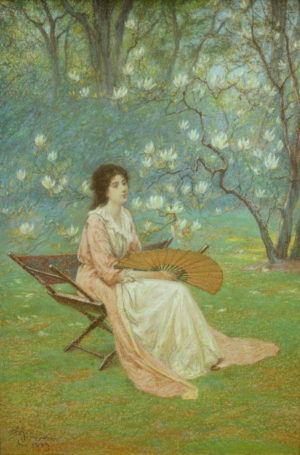Hennessy, William John (Irish/American, 1839-1917)
Irish landscape artist, genre painter and illustrator William John Hennessy was born in County Kilkenny but soon joined his father John Hennessy in Canada whence he had fled from the British authorities following his involvement with the Young Ireland movement of 1848. Moving with his parents to New York, the young William Hennessy began drawing while still in his early teens, and at 15 attended the National Academy of Design to study fine art painting. In 1857, he first showed at the National Academy in New York (NA), to which he was elected as a full member in 1863. The luminous quality of his landscape painting as well as the sentimental appeal of his genre painting won him considerable praise from art critics.
Hennessy was also a fine illustrator, receiving commissions to illustrate the works of American poets such as Tennyson, Longfellow, and Whittier. Co-founder of the Artists’ Fund Society, he became an honorary member of the American Society of Painters in Watercolours. In 1870, he moved to London. Between 1871 and 1882 he showed at the Grosvenor Gallery, New Gallery, and the Royal Academy (RA). In addition, he exhibited his work at Liverpool’s Walker Art Gallery, Manchester City Art Gallery, and the Glasgow Institute of the Fine Arts. In 1902 Hennessy became a member of the Royal Institute of Oil Painters. Meanwhile, during the period 1879-1907 he submitted eight paintings to the Royal Hibernian Academy (RHA) in Dublin.
After moving to London William Hennessy spent the summer months in Normandy, where he painted a number of rural-scenes and landscapes.
William Hennessy’s pictures are represented in many public and private collections, including: Amhurst College, Massachusetts; Ulster Museum, Belfast; Museum and Art Gallery, Brighton; Yale University, Connecticut; Brooklyn Museum, New York; National Academy of Design, New York; Vassar College, New York; and others.
Showing the single result
